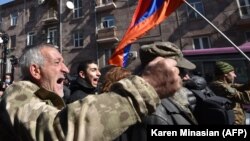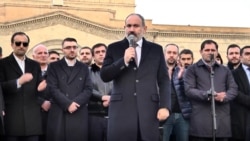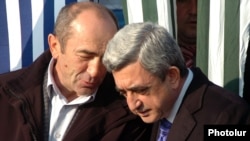Senior Armenian military officers’ February 25 call for the resignation of elected Prime Minister Nikol Pashinian has been described as an “unprecedented” move that put democracy at risk, but Armenian and Russian analysts suggest that the standoff is more the culmination of a long-term political dispute than an attempted coup d’etat.
“This is an imitation of a military coup. It’s an extreme intensification of the political struggle …” commented regional specialist Aleksei Malashenko, a chief researcher at the Russian Academy of Sciences’ IMEMO (Institute of World Economy and International Relations).
“[F]or a military coup, you need a dictator,” Malashenko continued. “On a white horse and with a saber. For now, I don’t see anything like that there.”
Alexander Iskandaryan, director of Yerevan’s Caucasus Center think-tank, agreed that 40 senior military officials’ public demand for Pashinian’s resignation is “not yet” a coup attempt.
“This is a schism of the elite” that “has existed for a long time,” Iskandaryan commented to the Russian-language news site Ukraina.ru. “You don’t even need any special inside [knowledge] to understand that, after losing the war [with Azerbaijan over Nagorno Karabakh and seven adjoining territories], the military looks extremely skeptically at the political leadership and at the disagreements within the elite. It couldn’t be otherwise.”
Speaking on Facebook, Pashinian was the person who first labeled the Armenian General Staff’s resignation demand a “military coup attempt” – a label that international media promptly adopted.
The demand followed a tit-for-tat between ex-President Serzh Sarkisian and Pashinian over why the government did not use Armenia’s medium-range, Russian-made Iskander missiles during the 2020 Karabakh war – missiles that Pashinian rejected as dysfunctional.
When the General Staff then questioned the prime minister’s ability to make “adequate decisions” amidst a crisis, the prime minister fired the armed forces’ chief of staff, General Onik Gasparian, and his first deputy, Lieutenant General Tiran Khachatrian.
The defense ministry rejected as “unacceptable” any attempt to involve the army in politics.
In a bid to defuse tensions, President Armen Sarkisian, who has 15 days to approve Pashinian’s dismissal of the men, met with General Gasparian and other senior military officers on the evening of February 26. Results of the meeting are not yet known.
Under the Armenian Constitution, if the president does not confirm Pashinian’s dismissal of Gasparian and Khachatrian, the order automatically goes into force within 15 days.
Urging the military to stay out of politics, prosecutors earlier had threatened to take legal action against any attempt to disrupt “public order.”
The clash between Armenia’s prime minister and armed forces builds on simmering resentments over who bears the blame for the November 2020 surrender of Armenian-held territory to Azerbaijan. While Pashinian has been tagged a “traitor” by the opposition for “destroying” the army and signing the ceasefire with Azerbaijan and Russia, the prime minister has lambasted the 2017 expenditure of a reported $42 million on an air defense shield that, he said, does not work.
This animosity, in turn, builds on the Pashinian government’s investigation of scores of suspected financial irregularities within the military, long dogged by a reputation for corruption.
Pashinian’s My Step bloc swept into office in 2018, with 70 percent of the vote, on the strength of his pledge to combat corruption, but, now, the key question has become whether that mandate will still enable him to overcome the General Staff's challenge of his leadership.
Rather than tanks in Yerevan’s streets, though, what was seen on February 25 were two separate protests by thousands of supporters of the army and of Pashinian. The prime minister’s critics have pledged to hold non-stop demonstrations on the Armenian capital’s central Baghramian Avenue, a traditional venue for opposition protests, until he resigns.
In another mediation bid, President Sarkisian met on the evening of February 26 with the main coalition behind the protests, the Homeland Salvation Movement.
Earlier in the day, in a warning to Pashinian, some protesters staged a re-creation of a military tribunal’s execution of communist strongman Nicolae Ceausescu and his wife, Elena, during Romania’s 1989 revolution.
As yet, though, nothing suggests that Pashinian plans to yield to the protesters. The turnout for his march through downtown Yerevan, “two to three times” the size of the pro-army protest, shows that the prime minister still “has serious support in society,” Аrmenian political scientist Stepan Grigorian said.
Yerevan-based regional security expert Richard Giragosian, however, commented to Al Jazeera that Pashinian rallying supporters to take to the streets “undermines his own legitimacy and moves the government farther away from the one natural way to resolve the crisis – new elections.”
Pashinian already has rejected that option. The country’s next parliamentary vote is slotted for 2023.
Grigorian, director of the Analytical Centre on Globalization and Regional Cooperation, also sees parliamentary elections as a way out of Armenia’s government crisis, but cautions that potential political traps remain for the prime minister.
Blaming Pashinian for the lost war with Azerbaijan now “unites” Russia and Armenia’s “former authorities,” he said.
With no clear rival to Pashinian, the Kremlin itself has expressed support for the prime minister. Talks are reportedly underway about Yerevan’s proposal that Russia move part of its 102nd army base in the western Armenian town of Gyumri to a location closer to the Azerbaijani border.
Nonetheless, pro-Kremlin Duma deputies and TV commentators have lambasted the prime minister for supposedly lying about the Iskanders. Russia denies that Armenia fired the missiles at all during the six-week conflict with Azerbaijan.
This criticism adds to that of ex-Presidents Robert Kocharian and Sarkisian, both natives of Nagorno Karabakh who cultivated close ties within the Armenian military and with Moscow during their time in office, and have ongoing grievances with Pashinian.
Pashinian’s government is prosecuting Kocharian, a former separatist leader of Karabakh who served as Armenian president from 1998 to 2008, on charges of bribery and for his administration’s fatal 2008 crackdown on presidential election protesters, including Pashinian himself. The former president is currently out on bail, and has told Armenian media that he intends to run for office in any early parliamentary elections.
Sarkisian, who claims he has no interest in returning to politics, has blamed Pashinian’s government for a series of alleged military fumbles in Karabakh; criticism made still sharper by the fact that Sarkisian, a former interior minister, defense minister, and national security chairman, has deep roots in Armenia’s military and law enforcement. During the 1992-1994 Karabakh war, he also oversaw the region’s so-called “self-defense” forces.
Grigorian, a critic of both men, contends, however, that Armenians should not let the Iskanders or the debate over who lost the war come between them.
Rather, he said, the country should focus on choosing “the best partners in military cooperation for tomorrow, and not throw blame at each other.”
Whether or not either side will heed such advice, the status quo is not expected to last. Predicted Vazgen Manukian, the Homeland Salvation Movement’s candidate for prime minister: Within the next few days, “the fate of our entire struggle will be decided.”
-With additional reporting by Armenpress, ArmInfo, PanArmenian.net, and Reuters








Facebook Forum